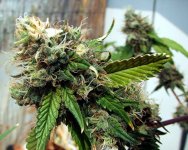Light Bleaching 101
- Thread starter Thread starter Pinball Wizard
- Start date Start date
L
LJB
Yes, increase the distance.
Just doing so slightly, 1/2 inch for example, would itself bring a major change to the number of photons falling on the plant.
Just doing so slightly, 1/2 inch for example, would itself bring a major change to the number of photons falling on the plant.
L
LJB
huh? I don't get it.
Response to me or the op?
inefectualize
Member
that is heat stress not light bleaching.....put a fan on your bulb
jaybutta
Member
that is heat stress not light bleaching.....put a fan on your bulb
Heat stress is exactly right...bleaching turns leaves straight white...best of luck...jay
hi pinball ,
,
^^^second inefectualize and jaybutta on that,
last week my plants looked exactly the same as yours on the picture and it was heatstress and no ventilation-->exhaust gets broke and lighting hangs very close to the tops, way tooooo close....
how close are your bulbs?....
 ,
,that is heat stress not light bleaching.....put a fan on your bulb
Heat stress is exactly right...bleaching turns leaves straight white...best of luck...jay
^^^second inefectualize and jaybutta on that,
last week my plants looked exactly the same as yours on the picture and it was heatstress and no ventilation-->exhaust gets broke and lighting hangs very close to the tops, way tooooo close....
how close are your bulbs?....
L
LJB
Heat stress is exactly right...bleaching turns leaves straight white...best of luck...jay
please post a picture if you have one, I would like to save it for reference.
L
LJB
is this what you all are talking about?

Strange that it's on the lower part of the plant in this example.

Strange that it's on the lower part of the plant in this example.
L
LJB
My first post was a little bit in haste. It is classic leaf scorch. But I'm still confused as to whether it's caused by by too much heat or too many photons.
I've experienced what can be seen in photo in post 10, but only on flower directly under the bulb, not lower down. I've responded by moving the lamps up slightly.
I've experienced what can be seen in photo in post 10, but only on flower directly under the bulb, not lower down. I've responded by moving the lamps up slightly.
L
LJB
Can you add to that? Do you mean like if the gardener sprayed the leaves, or was messy while watering the roots, or do you mean droplets from transpiration?
L
LJB
Ok. In the op's picture, I see possible chlorosis in the lower leaves, yellowing tips on the some of the upper leaves and scorching in the middle that is similar to what can be seen on the two small leaves in the picture that Weezard posted.
And maybe (in OP's picture) the bud on top of the plant on the right has some color characteristics similar to the picture in post #10.
Does anyone think I'm nuts? Need eyes checked further? Should shut up? haha
And maybe (in OP's picture) the bud on top of the plant on the right has some color characteristics similar to the picture in post #10.
Does anyone think I'm nuts? Need eyes checked further? Should shut up? haha
WeedChuck
Member
the reason it would be on the low part of the plant is most likely due to water droplets magnifying the light to a powerful concentration. enough to bleach it
will this myth ever die?????????
jaybutta
Member
please post a picture if you have one, I would like to save it for reference.
I apologize I do not have one...but there are tons all over the internet...Merry Christmas to all...jay
jyme
Member
looks like heat stress to me to.in the form of relitive heat.but you say you have good air exchange so tell me is your bottom leafs turning yellow. that cmh 400 hasnt got shit on the sun not even at 4 inches away. it could be a (P) deficency but looks more like RH
i meant Radiant temperature not relitive heat.Radiant temperature is the result of heat transfer bewteen objects at different temperatures without whats inbetween i.e. the air, being effected. In our case the plants are naturally at a lower temperature that the light and reflector so heat is transferred to the plants foliage from the light/refecltor through radiation. This causes the leaves to heat up. The plants can withstand much higher radiant temperatures (around 104-122degF) than they can air temperatures but if this is too high the plants can 'burn'.

 ...)
...)

